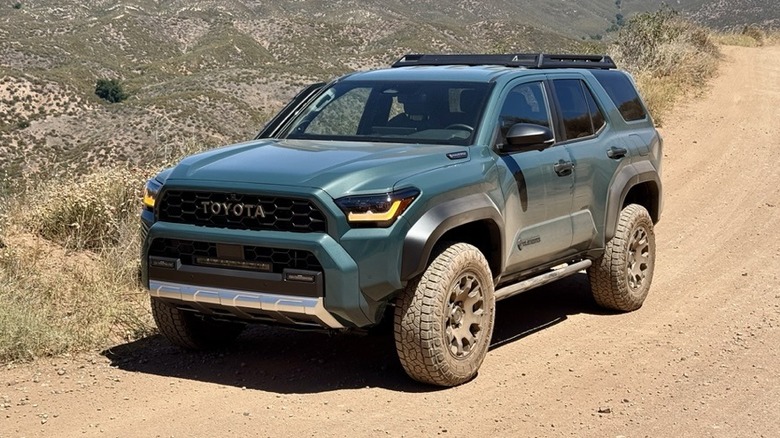
The Toyota 4Runner's recent redesign swapped its old V6 engine with one of two four-cylinder engines. The base engine is a turbocharged four-cylinder that produces 217 hp and 317 lb-ft of torque, while
the optional powertrain adds electricity to the mix with a hybrid system that boosts power to 326 hp and 465 lb-ft of torque. But even with the change to smaller-displacement, turbocharged engines (and a hybrid system), the latest 4Runner has some disappointing fuel economy numbers.
The previous-generation 4Runner, with its 4.0-liter V6, had an EPA rating of just 17 mpg combined (16 city/19 highway). Not being able to break past the 20-mpg mark is pretty bad, but the new powertrains certainly do better. I liked the hybrid powertrain when I tested the 4Runner Trailhunter recently, and it offers better fuel economy, ranging between 21 and 23 mpg combined — a big improvement compared to the old model. It represents an annual savings of about $750 in fuel according to the EPA's estimates. But, according to those same numbers, the 2025 4Runner will cost $1,750 more in fuel over the next five years than the average vehicle sold in the U.S. Why is it still behind the curve, despite the hybrid engine? It's a series of factors that include the vehicle's size, capabilities, and equipment.
Read more: 10 Toyota Models With Terrible Resale Value
Off-Road Prowess Comes At A Cost

Heavy off-road SUVs with four-wheel drive and all-terrain tires don't often perform well at the pump, even with hybrid powertrains. The first reason for the 4Runner's middling mpg is weight: Depending on trim level, the 4Runner weighs anywhere between 4,455 and 5,455 pounds. Four-wheel drive gives the 4Runner great versatility, but it's also heavy, which drags down fuel economy. And 4,450-plus pounds is a lot of weight to pull down the road -- at its heaviest, the 4Runner is only a few hundred pounds shy of a full-size SUV like the Chevrolet Tahoe. The hybrid-powered 4Runner still does pretty well compared to the Tahoe, though, which averages as low as 16 mpg on some trims thanks to the latter's big V8s.
There's also the 4Runner's off-road equipment to consider. With all-terrain tires on multiple trims like the TRD Pro and the Trailhunter, fuel economy suffers. All-terrain tires are better off-road, but they have higher rolling resistance on asphalt, which affects the 4Runner's mpg. Bulky fenders, useful-but-large roof racks, and extra equipment on the outside of the vehicle all increase wind resistance, too, further reducing fuel economy. The modern sixth-generation 4Runner isn't the most gas-guzzling SUV you can buy in 2025, but it's not a fuel-sipper either, even with a hybrid engine under the hood.
Want the latest in tech and auto trends? Subscribe to our free newsletter for the latest headlines, expert guides, and how-to tips, one email at a time.
Read the original article on SlashGear.











